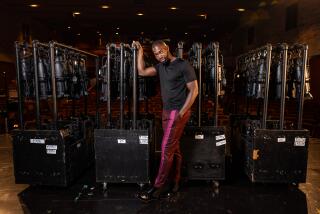STAGE REVIEW : ‘BREAKFAST,’ ‘HUGHIE’ IN O’NEILL FEST AT MELROSE
- Share via
One of Eugene O’Neill’s early and rarely staged one-acts (“Before Breakfast,” 1916) and one of his very last plays (“Hughie,” 1942) compose a strong duet at the Eugene O’Neill Theater Festival under way at the Melrose Theater.
The productions, serving almost as career bookends, and alternating with the much longer and more demanding “A Touch of the Poet,” signal a promising launch for what the theater intends as a continuing festival of O’Neill plays.
Certainly in the case of the shorter works, director Tom McDermott and his trio of actors capture the tone, texture and rhythm of O’Neill’s ravaged and/or forlorn characters.
“Before Breakfast” is tantalizing because of its comparative unfamiliarity. It is not only a thinly disguised autobiographical account of the failure of O’Neill’s youthful marriage to first his first wife, Kathleen Jenkins, but it represents O’Neill’s attempt with the Provincetown Players to see how far he could go with an uninterrupted single character monologue--or, more precisely, a one-sided dialogue.
A young desperate wife, impressively conveyed by actress Mary Wadkins’ scratchy, nervous anxiety, is preparing breakfast in a tacky Manhattan flat for an unseen, hung-over husband who remains offstage. For the 20-some minute length of the play, the wife scolds and frets, aiming her hurt at her unemployed wastrel husband heard stumbling out of bed. The most we see of him is his hands poking through a door.
This was high experimentation for 1916. The ending is melodramatic but Wadkins’ helpless pain at the discovery of adultery is sharply felt. (Incidentally, it was O’Neill’s brief marriage to Kathleen that resulted in the birth of the playwright’s oldest son, Eugene Jr., who was to commit suicide 40 years later in 1950.)
Local theater followers may remember Jason Robards premiering “Hughie” here in 1975 but actor Stan Weston’s portrayal of the play’s tattered Broadway character Erie Smith is a performance complete with its own memorable squalor and jocular definition.
The two-character hourlong one act also benefits from a wonderfully comatose performance by Charles Bouvier, as essentially a dead man of a night clerk in a seedy hotel in Gotham, until he’s inspired to a measure of life by the human need to pipe-dream--the identical thesis O’Neill had dramatized a few years earlier when he completed “The Iceman Cometh” (1939).
Protagonist Weston, a figure coming off a drunk, a cocky image of ruin in a fedora and rumpled white suit bragging about the Follies girls he has made, opts for an optimistic rather than tragic tone. He literally crackles in the role.
But its one silent moment--when Weston stands, his back to the audience, facing the cage of a hotel elevator, waiting for a ride up to an empty room and another night of 3 a.m. hells--is the most telling measure of the performance.
The hotel lobby set by Stephen Elspas (unlike his kitchen grime in “Before Breakfast”) is too squeaky clean and needs a touch of sleaze. Novella T. Smith’s lighting design in both plays is a solid contribution.
Performances are at 733 N. Seward Ave., Hollywood, Sunday, also Nov. 12, 13, 14, 26, 28, 29, 30 and Dec. 3-7, 7:30 p.m., (213) 465-0070.
More to Read
The biggest entertainment stories
Get our big stories about Hollywood, film, television, music, arts, culture and more right in your inbox as soon as they publish.
You may occasionally receive promotional content from the Los Angeles Times.









